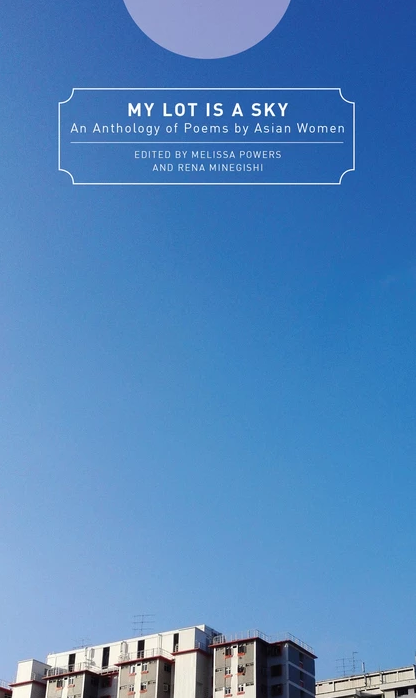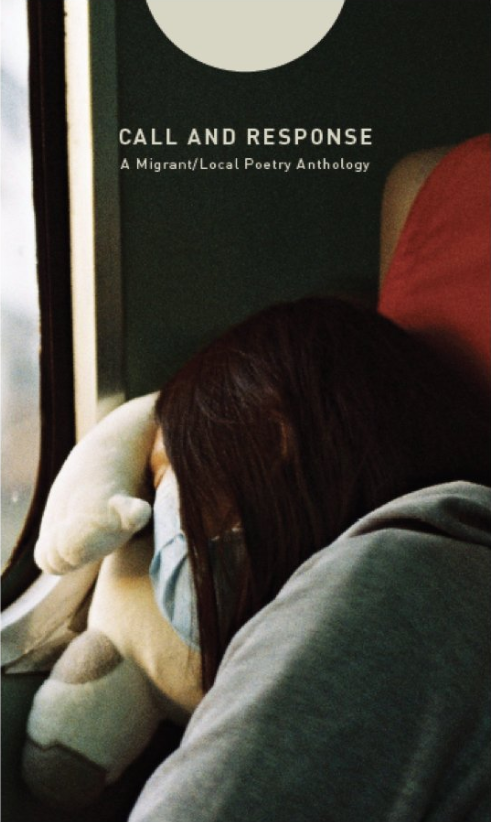|
In this post, I review two anthologies from Singapore’s Math Paper Press, based out of the store Books Actually. Anthology 1: My Lot is a Sky: An Anthology of Poems by Asian Women (2018) “What I would give to stem / this silent rebellion. To turn this / monthly battle into a bloodless coup.” So goes Mahithi Pillay’s “SOIL,” a poem as startling and incisive as it is raw and embraceable. It is one of 31 poems that make up My Lot is a Sky: An Anthology of Poems by Asian Women. This anthology, which holds little constraint or direction beyond the shared identities of its contributors, moves through the modes of theme and subject with fluidity. Compassion and human connectivity meet daily life and monotony. The harsh brutality of the innards of society meet loneliness and fatigue. And all the spaces in between find proper representation among the anthology’s brief set of pages. This space is challenged by the overarching concept of the anthology, the collection of writings, and it is a persistent challenge but not wholly defining or constraining. [. . .] I watched my sisters’ dark hair turn grain-yellow as we raced in the endless sandbox of the Gobi. When the shadows stretched Pa and Ma returned, nursing their wrists. From fresh, malnourished potatoes we made unseasoned feasts. (from “Not a Dinner Party” by Sherry X. Sun) As the editors, Melissa Powers and Rena Minegishi, say in their introduction, “The issue with writing about being an Other or being Othered is that to do so, you have to write with the perspective of those that aren’t part of your minority group. We wouldn’t dare to make the claim that it is impossible to write a good poem on the topic nowadays, but writing about how you are seen--rather than writing what you are seeing--can be too impersonal. Even if it’s about how ostracized you yourself feel.” The output that follows is ultimately both as they’ve put forth and as they have not. There is as much about the personal, individual experiences of each contributing writer as there is about the overall “Asian” and “female” qualities in these poems. The anthology, in that way, feels alive, hardly pinned down or boxed in. It is opened, and its honesty is potent. “strange, / a stranger at home every day. the calluses / in your fingers root too fast. i wanted / you to myself but they took your teeth / and left behind a bill for physiotherapy.” This fragment from “ALMOST HERE” by Pamela Seong Koon carries the intrinsic modality of the lived and mirror-shattering unique. Its language carries the core of our shared human existence through its own, singular purpose: to show, to reveal, to express. This is an anthology of soul-flowing expression, a sequence of poets providing poetry that gives as much as it takes to give. The extractive benefit, at times peripheral and at times spotlit, is its overarching theme, its binding together, its face. Especially as a white male reader, I must acknowledge and ponder the layers of meaning behind these poets. Len Cristobal’s “flowers of steam” and “sea of silence.” Cara Ow’s cracking hips and “ashy kisses.” Tysha Khan’s hidden hair and caught dew. The images that are coming from shared space and separated, distanced space. And space that is not the same space as mine, but space that is evenly distributed and accessed through this otherwise shared space. I found profound magnetism toward My Lot is a Sky because of its cohesiveness and its intentions, which lacked pretension and authoritative detachment. [. . .] This is our truth. We’re going to miss everything beneath this sky, even cotton, even rock. There’s a broken bridge in your hometown. I want to see you as a child running there. I want to catch you before you hit the ground. (from “Before the Honey Comes” by Kharla Brillo) Contributors of My Lot is a Sky are: Nicole Kang, Mahithi Pillay, Sherry X. Sun, Isabelle Leong, Lydia Lam, Natalie Wang, Priyanka Sutaria, Tham Zhen Teng, Aliyah Kim Keshani, Jocelyn Suarez, Tysha Khan, Chrystal Ho, Aliona Rastam, Migs Bravo-Dutt, Jollin Tan, Cara Ow, Len Cristobal, Sohini Basak, Shilrey Camia, Audrey Tan, Samantha Yap, Urvashi Bahuguna, Arfa Ezazi, Mary Jean Chan, May Chong, Kharla Brillo, Huda Arslan, Pamela Seong Koon, Anne Yeoh, Liz Ngiam, and Christine Ruth Tan. Anthology 2: Call and Response: A Migrant/Local Poetry Anthology (2018)
One of my favorite qualities of the anthology (as a book genre) is its experimental nature. The anthology takes risks, attempts an experiment, runs an exercise that fails or succeeds, or falls somewhere between failure and success. In many ways, the conversations that are opened through the concepts provided by the anthology are conversations that bring people together. The basis of an anthology is unity: we have multiple voices, multiple ideas, multiple something, included between the two covers. This proximity starts the conversation on a positive note, and from there we the Readers of the world can agree or disagree, but at least we begin in conversation. Far from my sight, Now I cannot speak with you, go towards you, touch you. You are far away from me, this long distance between us, This distance cannot be measured by any scale. (from “The Distance” by Kausar Ahmed”) Be solaced, for entropy scattered our carbon insides Across nascent planets, epochs of sighs, and somehow We turned upon this narrow road. How new constellations Kindle within the galaxies of our milky-white nerves As our palms collide—and how we will again. (from “The Collision” by Jerome Lim) In Call and Response: A Migrant/Local Poetry Anthology, the editors (Joshua Ip, Rolinda Onates Espanola, and Zakir Hossain Khokan) have taken the concept of the anthology to meta proportions: this is an anthology that doesn’t merely have conversation as the de facto core, but is keeping conversation and shared ideas as the premise of the inclusion of content within. The book brings together “migrants” (defined, essentially, as those who moved to Singapore and were not born in Singapore) and “locals” (the opposite, those who were born in Singapore) and have the former’s poetry responded to by the latter. What occurs is a grand experiment in respect and compassion for the identity struggles of migrants. Often concerned with labor, cultural barriers, and even ethnic difference, the poems of the migrants are often vast seeds of ideas in themselves, which then are inflated or deflated (or somewhere in between) intentionally or unintentionally by the locals. Most of the time the pairing (the call, and then the response) works to the benefit of everyone involved. At other times, the responses are lackluster and left me wanting just a bit more—a bit more connection, a bit more direct responsiveness. The anthology raises a question that might sit above all poetry, all poets, all poetry communities: how do we connect to each other’s work, each other’s writing, each other’s experiences? And do we have to? What is our commitment? At the risk of my generalization being potentially crude, I think it’s important to acknowledge the landscape of Singapore, like the landscape of most places, as one that must deal with hierarchy, privilege, and authority. As global crises and conflicts escalate exponentially, and the migration saga throughout the world is one growing more and more, the barriers and difference between “migrants” and “locals” is on many of our minds. The ideal is that we are no different from one another; and yet, the challenge in forcing our perspectives onto one another, through writing or otherwise, reveals the very real tensions: our perspectives are different, even if we want them to be comparable, and sometimes the gap may be just a bit too large, uncomfortable, and unpleasant. In some cases, those negative effects are reduced through common cause. As editor Rolinda Onates Espanola says in the introduction, in what is a series of statements on the nature of this anthology and the work that is going into it and emerging from it, “To me, this collaboration is a testament of equality and respect on both sides—whether ‘migrant’ or ‘local’. Migrants have always called for equality and respect, though these words may be blurred to some people. In the art of poetry, locals have responded with due respect and equality that migrants are clamouring for.” We want the conversation, at least, to be inclusive and bring us all into a shared, relatively-safe space. And this anthology reaches that point—conversation does not have to be perfectly aligned, perfectly accommodating, perfectly matched. Even to be in the same place at the same time is honorable and praiseworthy. When I am in this foreign land, I still run on the streets with a bag. The bag carries the food, the migrant dreams but books no longer have a place. (from “Bag” by Bikas Nath) Our nation is a book but we have no time to read. (from “Book” by Ann Ang) This anthology includes many writers from many countries, and beyond the lens of the anthology is the anthology’s other benefit: the international and multicultural nature of the collective writing. Bangladesh, Indonesia, the Philippines—just a few of the places that the migrants may call home, or “previous home.” It was in awe that I read through the journeys of such diverse writers with incredible stories and situations, alongside the Singaporean locals, whose own experiences cannot be discounted either. It would take a long time to compare and contrast each and every writing pair in this book, and for that I find the book immensely successful. Contributors of Call and Response are: M.R. Mizan, David Wong Hsien Ming, Zhang Haitao, Janice Heng, Shobina Suja (Rose), Teo Xiao Ting, Hou Wei, Zhang Ruihe, Menik Sri Bandar, Yong Shu Hoong, Ramasamy Madhavan, Nabilah Said, Md. Riazul Islam Riaz, Min Lim, Zahirul Islam, Gwee Li Gui, Zakir Hossain Khokan, Marc Nair, Bikas Nath, Ann Ang, Naïve L. Gascon, Amanda Chong, Mohiuddin, Theophilus Kwek, Kausar Ahmed, Jerome Lim, Rajib Shil Jibon, Ang Shuang, Glory Ann Balista, Desmond Kon Zhicheng-Mingde, Monir Ahmod, Tse Hao Guang, Mahbub Hasan Dipu, Yeow Kai Chai, Olivetti Millado, Rodrigo Dela Pena Jr., Marylyn Tan, Rea Maac, Pooja Nansi, Eli Nur Fadilah, Jennifer Anne Champion, Yolanda Yu Miaomiao, Christine Chia, Nora Grimaldo, Stephanie Chan, Wiwik Tri Winarsih, Aaron Lee, Rolinda Onates Espanola, Paul Jerusalem, Manivannan, Charlene Shepherdson, Sugiarti Mustiarjo, Madeleine Lee, S. Rahman Liton, Daryl Lim Wei Jie, Deni Apriyani, Alvin Pang, Eric Tinsay Valles, Windu Lestari, Aaron Maniam, Rhonelyn Joy Gabucay, and Cyril Wong.
1 Comment
8/10/2022 01:01:11 pm
Süper içerik. Kemer transfer: https://www.alanyagroup.com/kemer-airport-transfer/
Reply
Your comment will be posted after it is approved.
Leave a Reply. |
Welcome to Yellow Rabbits. Thanks for visiting.
All reviews by Greg Bem unless marked otherwise.
SearchYellow Rabbits Reviews
Archives by Month
August 2019
|


